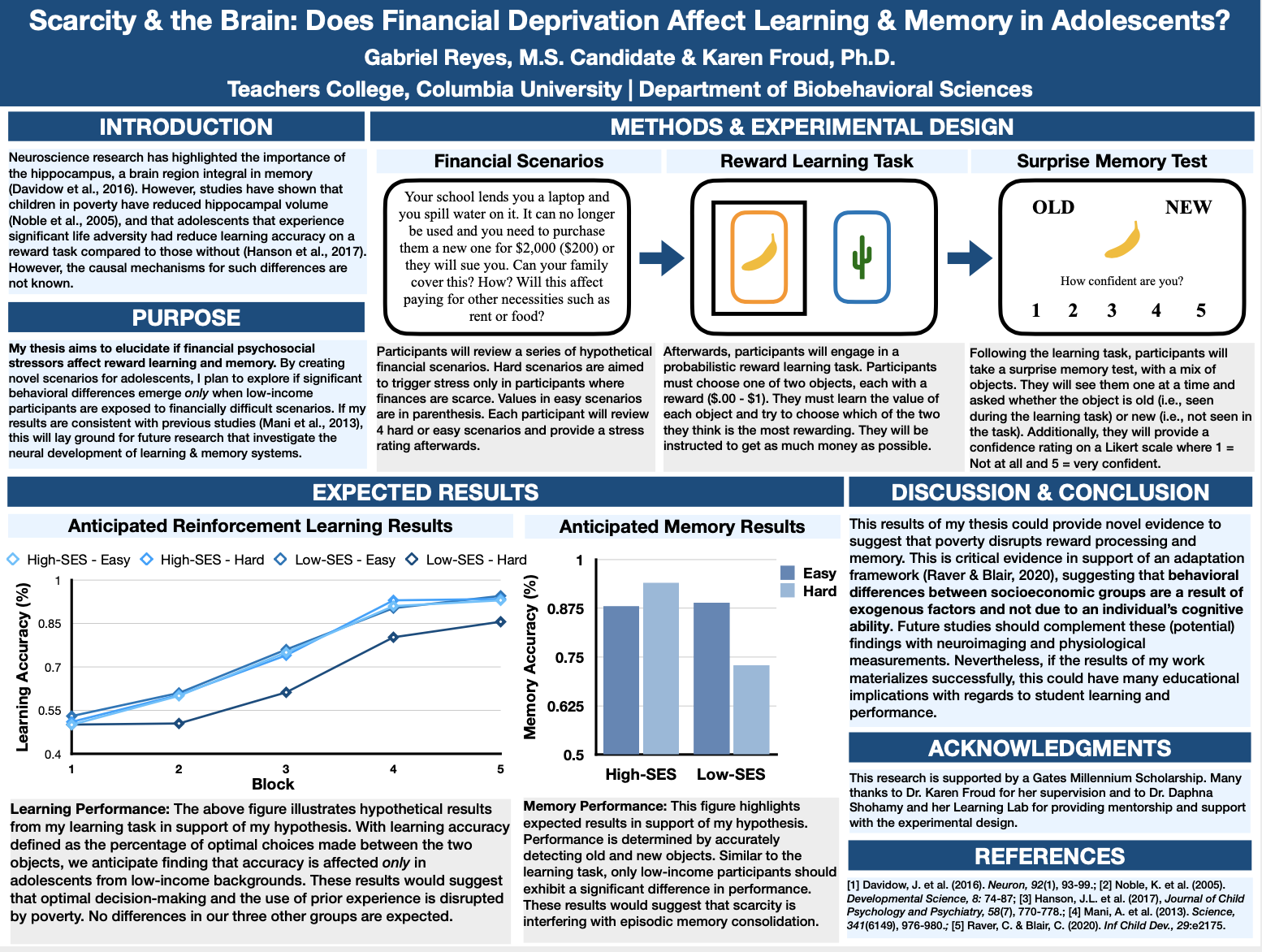My first indepedent poster presentation!
A week ago, I received an email from Teacher College’s Academic Festival coordinator informing me that my thesis research is 1 of 9 finalists for their Innovation Scholarship for Best Student Research Award (!!!). It is quite the honor knowing that out of ~4,500 graduate students, my ideas placed in the top 10 (which is so surreal to think about!). To determine which project will earn the prize for best student research, finalists had to submit a poster along with a 3-minute video presented next week in front of a live audience of alumni, judges, faculty, students (including the other finalists).
A few things to note about my poster:
- I created this in an hour due to a surge of motivation and dopamine (I was so happy and excited to give a science talk you have no idea)
- The results are hypothetical (due to COVID, the conference typically happens in the Spring, but they moved it to the Fall and allowed students to discuss proposals of ideas in the event it disrupted data collection. Mine was but also delayed as I finalize this IRB application)
- Allowing only 3-minutes to present this poster was absolutely criminal (it was so hard…)
Below is an image of the poster I submitted along with a transcript of my talk! (You can find a file of it HERE for a closer look or copy, and a video of the actual presentation will come once they release it but until then please accept a photo my partner took of me when I was recording it towards the end of this post).
 Poster presented at the 2020 Teachers College (Virtual) Academic Festival
Poster presented at the 2020 Teachers College (Virtual) Academic Festival
TC Academic Festival Poster Talk
“Hello, everyone! My name is Gabriel and I am a current M.S. candidate in the Neuroscience and Education program here at Teachers College. Today I want to present to you my current thesis project titled “Scarcity and the Brain: Does financial deprivation affect learning and memory in adolescents?”
Now, my current project was inspired by my own journey to TC. Growing up in poverty, I encountered many financial obstacles in pursuit of my learning: there were times when I couldn’t focus in class because I was too hungry or distracted during a test because my parents couldn’t afford rent that month. But sadly this is an ongoing problem that affects millions of students enduring poverty. Figuring out how our experiences shape our developing brain and its subsequent impacts on learning was what drove me to TC.
While here, I got to learn from Daphna Shohamy, one of the leading neuroscientists investigating learning and memory. Her lab does reward learning tasks, like the one shown here, where participants choose between one of two objects, each with their own value. The goal is to choose the object with the most value by memorizing each object’s value using prior experience. Research shows that teenagers are really good at this task (sometimes even more than adults!). However, some studies have found that children that experience significant early life adversity performance differently — yet we do not know why.
One of my favorite studies that helped inspire my current experimental design was led by Mani and colleagues at Princeton. They found that exposing participants to financially difficult scenarios — like “you need to pay $2,000 to fix your car?” —impaired performance on an IQ and cognitive task ONLY in low-income participants. However, if you asked this same question with something lower (like $200 vs $2,000), no differences in performance between income groups emerged. So I want to know if such a design will (1) work in teenagers and (2) if it does, will it affect learning and memory?
To test this, I created novel scenarios for adolescents — like the one shown on my poster — where they will review either hard or easy hypothetical situations. After reviewing 4 different ones, they will then do a standard reward learning task. Finally, they will do a surprise memory test where they will see objects one at a time and determine if it is old (meaning it was in the learning task) or if it is new and not shown in the task.
If my hypothesis holds and is consistent with prior research, then I anticipate finding learning and memory performance impairment ONLY when low-income adolescents are exposed to financially stressful scenarios. These results would suggest that performance is environmentally-driven versus intrinsic. In other words, people’s ability to learn and optimally process information is not fixed and is instead disrupted by poverty. While research often highlights gaps in educational attainment among low-income students, I believe that my research can shed light to the root causes of those gaps to influence policy equitably and support students living in poverty.
Thank you for listening.”

If you made it this far here’s a picture of giving my talk provide by Juan Llamas!
Leave a comment